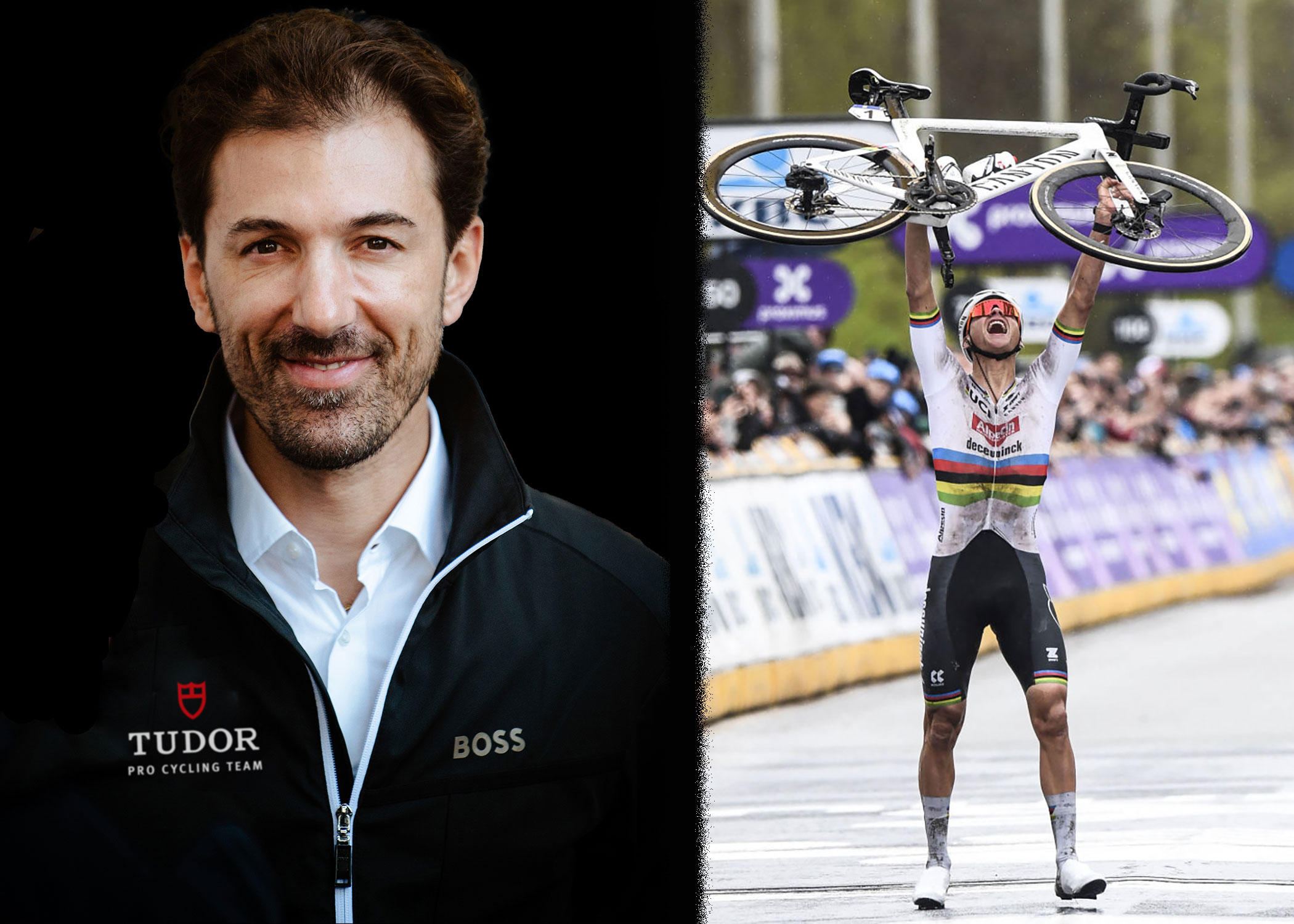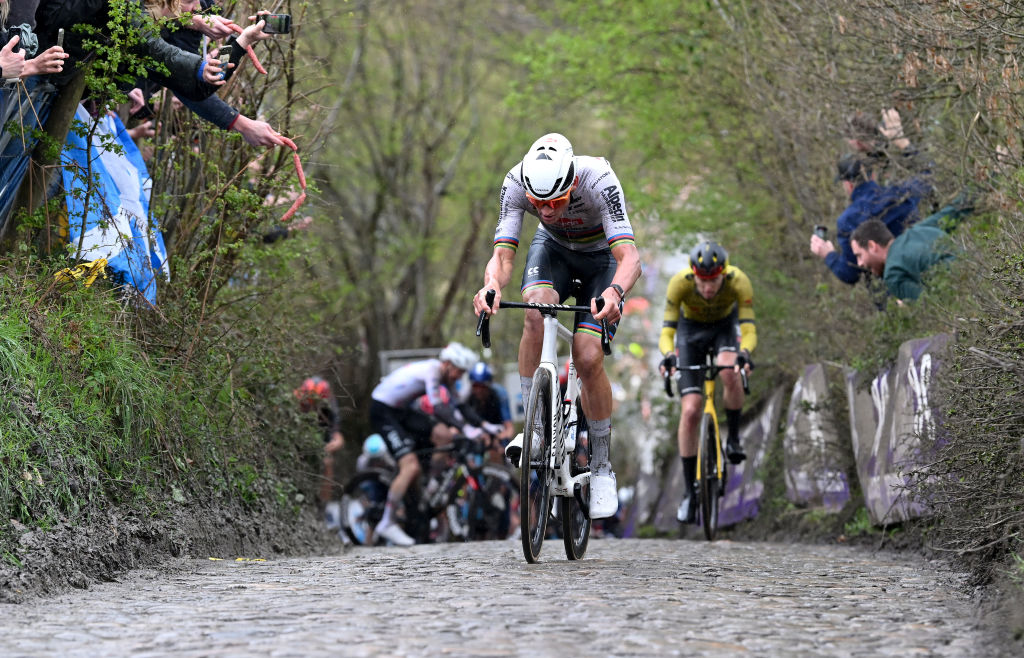
Sometimes, all you can do is say ‘chapeau.’ Mathieu van der Poel was the strongest rider and he won the Tour of Flanders decisively, but his Alpecin-Deceuninck team deserves a special mention too.
Everybody knew Mathieu was the favourite before the race, and everybody had a similar idea about how to try to beat him – isolate him by destroying his team. They might even have felt encouraged to do that by what they saw from Van der Poel’s team at E3 Saxo Classic. But on the biggest day, Alpecin-Deceuninck stood up to everything that was thrown at them.
From the Koppenberg onwards, Van der Poel showed his strength, but before that, we saw a long demonstration of how good his team really is. Alpecin-Deceuninck controlled the peloton early on, they always had riders around Van der Poel when he needed them, and they even had Gianni Vermeersch to mark Mads Pedersen’s (Lidl-Trek) long-range attack.
You can’t win the Tour of Flanders by yourself, you always need a team around you, and we saw that again on Sunday. This was a super strong Alpecin team. They took Jasper Philipsen out of the line-up to rest him for Scheldeprijs and Paris-Roubaix, but that also meant the team on Sunday was 100% built around Mathieu. Every one of them had a job to do and they executed it. In a big race, they showed up big time.

While Alpecin-Deceuninck got everything right, I was less sure about the approach of their rivals, but it certainly made for a dramatic race. The Tour of Flanders is already long and demanding, and the rain and cold made a tough race even harder. To add to that, we saw the contenders start attacking more than 100km from the finish, which is so different to how the Tour of Flanders was raced in the early years on this course.
That all started with Mads Pedersen on the Wolvenberg and then the Molenberg. I was surprised to see him go on the offensive from that far out. His aggression seemed to ignite the whole race, because then we also saw Visma-Lease A Bike trying to get riders up the road too.
Once Mads kicked it all off, everybody started counter-attacking, and the race kept breaking up. It was as if they saw him and just said, ‘OK, let’s go.’ That set off a domino effect of attacking in all directions, and they hadn’t even reached the hardest climbs by that point.
The problem for Pedersen is that he had a rider from Alpecin-Deceuninck with him. In my opinion, once he saw that Vermeersch was coming with him, he needed to stop and do it differently. Losing Jasper Stuyven before the race clearly meant that Lidl-Trek had to change their plans a bit for the Ronde, but I didn’t expect to see Mads off the front so far from the finish.
Pedersen paid a price later in the race and he cramped up, which cost him a shot at a podium place, but then again, his preparation wasn’t helped by his crash at Dwars door Vlaanderen either. Maybe that had an impact on his approach to the Ronde.
Visma-Lease a Bike rode in a similar way, trying to get riders ahead of Van der Poel, but the situation always looked under control. His team helped a lot, but sometimes, like on the Valkenberg, he was able to shut things down by himself as well.

The Koppenberg was the deciding moment, the place where Van der Poel made his winning move.
The Koppenberg was the deciding moment, the place where Van der Poel made his winning move. And, of course, the image of so many riders walking up the climb is something that cycling fans will always remember. On one level, it’s not cool to see riders forced to walk like that, but on the other hand, that’s just part of the Koppenberg when it rains and part of what makes the Ronde such a tough, special race.
Just behind Van der Poel, Matteo Jorgenson was one of the few riders able to ride up the Koppenberg. He was still chasing after the climb, but he had already used a lot of energy by then. Even though his form was clearly great after winning Paris-Nice and Dwars door Vlaanderen, he went backwards after the Koppenberg.
After a race like this, you can always talk about ifs and maybes. If Wout van Aert had been there, or if Mads Pedersen had been 100%, or if it hadn’t been cold and raining, then it could have been a different race, sure. But we still saw an epic Ronde. Maybe the other teams didn’t play their cards in a super smart way, but on the end, the strongest rider won the Tour of Flanders.
Mathieu has now equalled the record with his third Tour of Flanders win, and I think he’ll be a four-time winner pretty soon. It’s just a matter of time.
Tudor’s Tour of Flanders debut
At Tudor Pro Cycling Team, we made our debut at the Tour of Flanders, and that was a big moment in the development of our squad. It wasn’t the best day we’ve had in the Classics this Spring, but it was still a very important experience for everybody.
Even if we didn’t get the outcome we wanted in terms of a result, the process was still a good one. We had a plan and the team executed it, despite the miserable weather and some bad luck. Marius Mayrhofer, for example, had a couple of punctures at really bad moments. You can’t come back from that, but that’s just sport.
We were aiming for a top 10 finish, but we had to settle for 19th with Matteo Trentin. He didn’t have his best day, and he said as much afterwards. If he had been on a normal day in a race like this, then he would definitively have been up there with the guys riding for the places in the top 10.
At the end here, he was suffering, and he wasn’t even able to do the sprint with his small group. That happens, and Matteo was still happy with how the team has progressed in these races. That’s what counts.
Looking at the whole Spring, I have to say we’re very pleased with Tudor’s first experience of the cobbled Classics. It was a test for the riders and for the whole structure. We had sickness and crashes, which meant we had to make a lot of changes as we went along. This year, we were already doing more racing and different racing than before, but everybody has responded positively to the pressure that comes with that.
We have more big challenges coming up, including our Grand Tour debut at the Giro d’Italia. We have guys preparing for that right now in snowy Sierra Nevada, where Tadej Pogacar is training too. But we can take a moment and reflect in a positive way on what we’ve done in Belgium.
Sometimes guys haven’t finished these races, but that’s because they’ve had a specific job to do to execute the plan of the whole team. When our team starts a race, every rider has a purpose. This Classics campaign was a big step, and it will help them make even bigger steps in the future.

Get unlimited access to all of our coverage of the Spring Classics- including reporting, breaking news and analysis from the Paris-Roubaix, Tour of Flanders and more. Find out more.







